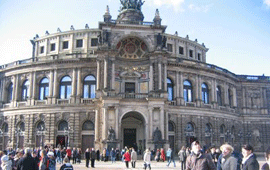> [Archived] Chronicles

Dresden Festival 2010
… Dresden, a town which was reborn from its own ashes like a phoenix. It is incredible to see here how the buildings which were destroyed during the Second World War bombing were rebuilt and recovered their original glow. The Dresden Festival was also created through a political order in 1978, back when Dresden was part of the German Democratic Republic, but which has today, to a sort of glow, a western aura.
For example, Sunday, May 23rd 2010, I listened to the famous Semperoper in Dresden, a fabulous orchestra, the Symphonic Orchestra in Pittsburgh, conducted by the Austrian Manfred Honeck, who is the musical director of this band, together with the soloist of the evening, cellist Jan Vogler, who is also the manager of the Dresden Festival. I say I listened to a fabulous orchestra because the audience was standing in order to cheer this ensemble, who proposed a wonderful version of Gustav Mahler's Symphony No.1 which we listened to at Radio Romania Music in a recording I myself broadcasted in February 2010 at Music box.
I am really sorry to say this orchestra will not come to Bucharest, as it was previously predicted, on the day of the opening of the Enescu Festival in 2011 and Manfred Honeck, in the interview he granted me, told me he was very sorry, but, because the American orchestras have very precise rules when organizing european tours and the plane tickets were not meant for Bucharest.
On Monday, May 24th, at 11 o'clock, within the same festival, the famous cellist Mischa Maiski performed accompanied by his 23 year old daughter, Lili Maiski, an excellent programme with Russian works: miniatures by Mikhail Glinka, Anton Rubinstein, Piotr Ilici Tchaikovsky, Nikolai Rimski-Korsakov and Sergei Rachmaninov (mostly transcripts of romances of these composers) and in the second part of the recital, the Sonata op.40 by Dmitri Shostakovich. We know Mischa Maiski from his concerts in Bucharest, at the Enescu Festival - we discovered the same musician fully dedicated to his art, with wonderful nuances in his songs as a deep baritone voice - and how hard it is to play such a cello …
Lili Maiski is a young pianist, born in Paris, who studied in many european musical centres. Contrary to the expectations, Lili didn't learn Russian from her father - we discovered this in the interview both of them graciously granted me after the recital. And as they say like father, like daughter, this saying can be checked once again regarding this musician Maiski family- I admired in Lili Maiski a pianist mature for her age, who benefited fully from the professional privilege of being always around a great name of the classical music, as Mischa Maiski.
On Tuesday, May 25th 2010, I had the opportunity to be one of the (very) few accredited journalists at the meeting with the conductor Valery Gergiev, who was going to perform a concerto conducting 'his orchestra', the Orchestra of the Mariinski Theatre in Sankt Petersburg. And I discovered in Valery Gergiev a very different personality from what one can imagine a conceited star can be. Of course, he is very conscious of his value (we talked quite a lot about the fact that 'Times' magazine assigned him among the first 100 most influential personalities in the world), but he always bestowed this influence in someone else's favour, in order to help those who deserve to be helped at the beginning of their career: he spoke very enthusiastically about the pianist Denis Matsuev, who was going to replace Helene Grimaud that evening, unavailable due to health issues.
And of course, he told me in a short statement, he could not wait to come back to Romania, in September 2011, at the Enescu Festival.
The concerto of the Mariinski Theatre Orchestra, conducted by Valery Gergiev took place at Kulturpalast - a building with a communist aura erected in the middle of the old town Dresden. In the programme: the overture of Tannhauser by Richard Wagner, Sergei Rachmaninov's Rhapsody on a Paganini theme for piano and orchestra and the Symphony no. 6 by Piotr Ilici Tchaikovsky.
What impressed me most was the performance of pianist Denis Matsuev. A 35-year-old pianist who tames the piano, from the strongest forte to the imperceptible nuances of piano, from the most agile pieces of virtuosity, to the most lyrical moments. It is a name we shall hear about, so I can understand why Valery Gergiev chose to support him in his career, which materialized in an American tour, extremely appreciated.
The Dresden Festival, edition 2010 takes place between May 19th and June 6th: it is a festival with a budget of 2,7 millions euro, out of which 20 % come from the State budget. It is a festival with great ambitions, conducted by one of the most important cellists today, Jan Vogler, with a brilliant career, especially in the United States of America. This year, the topic of the festival was Russia; I asked Jan Vogler if such a topic is not sensitive for the public in the former communist Germany; his answer was that after 20 years, it is time to try to get over history injustice.
At Radio Romania Music, you will get the opportunity to listen to the interviews granted by the protagonists of the concertos I listened to at Dresden, as well as the music fragments in these concertos. Also, you can listen to the broadcast 'Records season' in order to listen to some of Jan Vogler records, the cellist who will have a concerto in Bucharest, in January 2011, at the Romanian Atheneum.
Translated by Zenovia Popa, Andreea Velicu
MA students, MTTLC, Bucharest University














